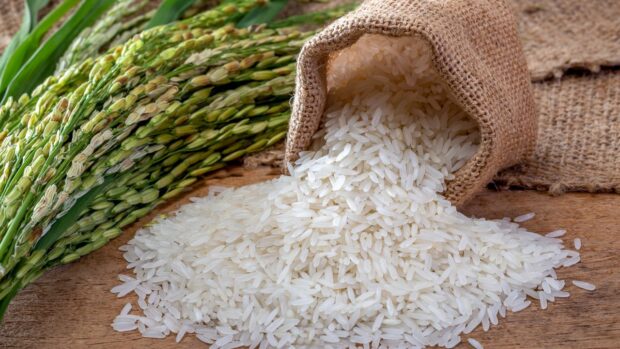Rice tariff cut won’t spell deluge of importation, says Romualdez

Rice is the top staple food of Filipinos. INQUIRER.net stock images
MANILA, Philippines — President Ferdinand Marcos Jr.’s approval of reduced rice tariff would not result in the flooding of importation, Speaker Ferdinand Martin Romualdez assured the public on Thursday.
The top leader of the House of Representatives said in a press briefing that rice importation flow will remain the same because the tariff cut is just aimed at absorbing the impact of high rice prices in the world market.
“‘Iyong pag-iimport hindi na ‘yon babaha kasi there’s a regular flow of imports, ‘yong pumapasok na bigas ay sapat lang talaga, hindi naman babaha, ‘yong maa-adjust lang ay ‘yong taripa. So ‘yong babayaran lang, mababawasan lang,” explained Romualdez, following a meeting with stakeholders from the rice industry
(There would be no flooding of imported rice because there’s a regular flow of imports, what goes inside the country is only enough, only the tariff was adjusted. Only the payments would be reduced.)
READ: Marcos approves cut in rice tariff to 15%
Article continues after this advertisement“The imports coming in [are] just to ano, support the shortfall, that’s the only role of the imports […] kasi tumaas ‘yong world market prices eh, kaya sasabihin ng ating Presidente kasi tumataas masyado ‘yong world prices para hindi masyadong affected ‘yong local market prices, binabawasan ‘yong taripa para to absorb,” he added.
(The imports coming in are just to support the shortfall, that’s the only role of the imports…because world market prices have increased, that’s why our President would say that the world prices spiked so to mitigate the effects on local market prices, the tariff is reduced.)
Romualdez also reiterated that support to farmers would continue, as the provision of assistance through the Rice Competitiveness Enhancement Fund (RCEF) would go on.
Tariffs required of imported rice are directed into the RCEF, as provided under Republic Act No. 11203 or the Rice Tariffication Law (RTL).
“Our support to the farmers will continue, through the subsidies to our local farmers which is very, very important part of the whole sector, the industry,” Romualdez said. “We support them, the subsidies will continue, they are a very, very important part of the agriculture sector, particularly for rice production.”
“So rest assured, this should be rest assured that there would be no flooding because the constant flow of rice will just be as is regulated. There’s most, wala pang 400,000 yata a month, so that’s it, it stays as it is, it’s only the reduction of the tariff. So the protection for our farmers through subsidies will continue […] So there’s nothing to worry there,” he added.
READ: Rice tariff cut to ease upward pressure on prices, says Neda chief
Last Tuesday, Socio-economic and Development Secretary Arsenio Balisacan said President Marcos approved tariff cuts on rice, coal, and other basic commodities.
Balisacan said Marcos, who chairs the National Economic and Development Authority Board, approved the new Comprehensive Tariff Program for 2024-2028, which calibrates tariff rates until 2028.
On Wednesday, Romualdez and other lawmakers said they believe the rice tariff reduction would bring about lower rice price in the local market. However, the Speaker maintained there is still a need for long-term solutions – particularly amendments to the RTL.
The House approved on May 21 House Bill No. 10381, which seeks to amend the RTL, to restore some of the National Food Authority (NFA) functions.
If signed into law, NFA will have the “authority to oversee and ensure compliance with all pertinent standards and regulations, leveraging its established expertise and nationwide network to uphold the national interest, in rice buffer stocking and food security,” by placing a new Section 5 in R.A. No. 8178.